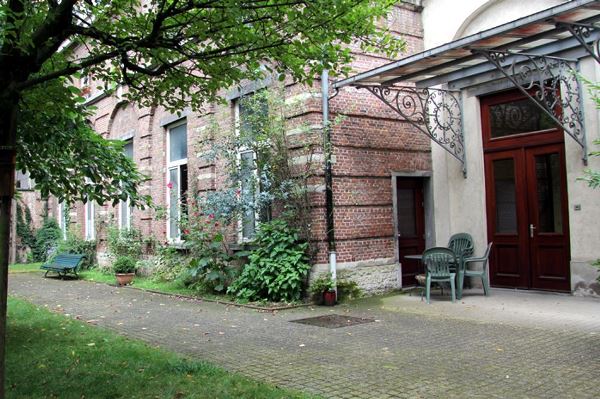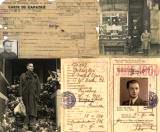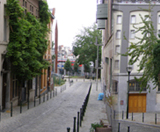Summary and abstracts of issue n° 110
Philippe Mesnard: Editorial: Demande de fable, exigence de vérité [Asking for fables, demanding the truth] (pdf in French) (pdf in Dutch)
Dossier: Displacement, deportation, exile
Philippe Mesnard (Auschwitz Foundation, Blaise-Pascal University – Clermont-Ferrand 2): Problématisation générale (pdf in French) [The general problem]
I. Displacement and deportation
Annette Becker (Paris West University – Nanterre, Institut Universitaire de France) : Les déplacements de population pendant la Grande Guerre : exodes, refuges, camps, travail forcé (pdf) [Population displacements during the First World War: exodus, refuges, camps, forced labor]
- Consciously or not, the Great War has been a laboratory for the 20th century. It was a field where violence could be experimented, a place to put it in practice and optimize its effects on men and equipment. The invasion and military occupation zones in particular gave the opportunity to test in life size the displacements, repressions or even the extermination policies concerning the Armenians living in the Ottoman Empire.
Etymologically the latin word “exterminare” means “to expel, to send across the borders”. For the civilians who were invaded and occupied between 1914 and 1918 “being exterminated” would imply this way of being literarly knocked out of the front line while they are actually included in it. To run away, to look for shelter, but forced by invasion is active; to be expelled, deported forced as a hostage, or for forced labor is passive; in every instance it means being torn from the place you live in and brought to a place of exile which is temporary, i.e. the time the war lasts. But this generally means four years. We will attempt a (too) general typology of the displacements of the numerous populations that concerned millions of civilians throughout Europe.
Janine Altounian (writer and translator) : Lecture et refoulement d’un Journal de déportation (pdf) [Review and suppression of a diary of the Armenian deportation]
- A personal experience will tend to show how the psychic position of someone varies when readinga deportation Journal reporting events that were undergone during the Armrnian genocide in 1915; how reading this modifies his relationship with truth and reveals to him how he repressed theimpact of too personal facts of his intimate history although he had known them for a long time.
II. Exile and exodus
Sandrine Marchand (University of Artois) : Taïwan, l’exil impossible (pdf) [Taiwan, the impossible exile]
- In 1945, after 50 years of Japanese colonisation (1895-1945) Taiwan is given back to the leader of the Chinese national party Chiang Kai-shek who will be pushed out of China with his army and his government by Mao’s communist forces during the Civil War which ended in 1949. The Continentals, as they were called by the native born population, will live in an exile that was supposed to be temporary but that would last until today. The nationalist regime started to build up a nostalgic anti-communist discourse hoping to reconquer the continent where the Continentals who were separated from their country of origin and their families would get together again. As far as they are concerned, the native Taiwanese don’t recognize themselves neither in this discourse nor in that government they have diverged from since 1945 and keep living with the oppression and the memory of the massacre of the 28th February 1945 caused by the nationalist government, and which will be continued up to the beginning of the sixties, by the so called White Terror period, particularly involving left wing intellectuals. The elaborate identity situation of Taiwan has been the object of two stories based on memory, of two different constructions of History, clashing with one another, found in political discourses but also in litterary writings and testimonies.
Catherine Milkovitch-Rioux (CELIS, Blaise-Pascal University – Clermont-Ferrand 2, Institut d’Histoire du Temps Présent (IHTP) [Institute of Contemporary History] ̶ CNRS, Paris) : Enfance violence exil : Témoignages d’enfants de harkis (pdf) [Childhood, violence, exil: testimony from children of Harkis]
- As part of the reflection on “displacements, deportations, exile” initiated by the Auschwitz Foundation the object of this presentation is the testimony of the Harki's children about Harki camps in the aftermath of the Algerian War. In “De l'exode à l'exil. Rapatriés et pieds noirs en France” [From exodus to exile. Rapatriates and “pieds noirs” in France] Jean-Jacques Jordi emphasized the extent of population movements at the end of the Algerian War. The populations of the so called “French repatriated muslims” and the “pieds noirs” populations are concerned with this “exodus” and “exile” and are specifically subject to a “repatriation” the State took care of with the well known failures.
For the children of the harki the memory of the Algerian War extends in memory of internment: the Algerian relegation space is extended into the exile of “repatriated French muslims” who are the victims of a “war immigration”. In France the real relegation spaces – reception camps, forest hamlets or urban estates where memory is refused and concealed – are the daily setting of “the Harki's son”: we will examine, through the testimony of this second generation of the Algerain War, a paradoxical legacy that seems to be a burden put on the shoulder of the children by the quality, the history, the conditions of displacement, exile and internment of the auxiliary elders.
Sofia Volpato (ACLI Limburg) : Le premier après-guerre en Italie (pdf) [The immediate post-war period in Italy]
- The article deals with the presence of Italians in Begium in the twentieth century.The migratory phenomenon starts expanding essentially after World War I: the coal mine companies are looking for foreign workforce to win the “battle of coal” specifying the first agreements on collective recruitment under supervision of the State. On the eve of World War II the estimated number of Italians living in Belgium is 30 000. This displacement of population between the two wars should be closely related to escaping from Mussolini's dictatorial regime. In Belgium political and economical emigration are so closely entangled that it becomes difficult to tell them apart. The author recounts episodes linked to propaganda, the Resistance and the deportation up to the signature of the 1946 – Agreement stressing the fact that the displacement and the exile of Italians in Belgium are actually an economic deportation as its characteristics are very close to a murderous deportation.
Maité Molina Marmol (University of Liège) : Les Niños pendant la guerre civile espagnole, déplacements et placements (le cas de la Belgique) (pdf) [Children during the Spanish Civil War: displacements and placements (the case of Belgium)]
- The Spanish War (1936-1939) caused important population displacements, either voluntary or forced, internal or external. This article deals with the specific displacement of the Niños de la Guerra, which was organized by the Spanish Government especially after the bombing of Guernica in April 1937. Belgium was one of the countries that answered the call of the Republic to welcome the children: from the 32 000 evacuated children 5000 arrived in this country.The arrival conditions of the Ninos will be taken in consideration, as well as the modalities of accomodation, and the repatriation of most of them when the second World War was announced, but also the destiny of those who would permanentely settle in Belgium.
III. As seen from the outside
Corinne Enaudeau (Philosopher) : Réfugiés et apatrides : des droits en moins, des hommes en trop (pdf) [Refugees and stateless people: too few rights, too many people]
- Claiming in 1942 the constitution of a Jewish army appeared to Hanna Arendt as the imposition of a political reading of persecution and pretending that the Jewish people, though they were without territory or State should defend their collective existence and claim their identity on the scene of History. Here comes the question how to discern people, nationalities, nations and states.For it is due to these interactions that some populations are expelled from “the rights to have rights” which is a prelude to their massacre. We are trying to understand what persecution owes to confusion between rights, territory and identity. Refugees and stateless persons are outcasts who did not only lose a home, geographically speaking, but mainly the right to be here, wherever this may be, i.e. the right of being part of, ;appearing, and standing up in the visible world.
Other
Régis Schlagdenhauffen (Doctor of sociology – University of Strasbourg) : Le Dodenherdenking à l’Homomonument d’Amsterdam : commémoration des victimes du nazisme et usages politiques de la mémoire (pdf) [The Dodenherdenking at the Amsterdam Homomonument: commemoration of victims of Nazism and political uses of memory]
-
This article focuses on the analysis of a commemorative ritual that aims at remembering the homosexual victims of Nazism. This ritual takes place each year in May at the Homomonument in Amsterdam. I explain first the origin of the ceremony and the genesis of the location. Second, I examine which social relations are promoted during the ritual and how the groups supposed to be influenced by the ritual, namely the new recruits of the police academy and the young men with Moroccan background react. The latter group is considered to be the main perpetrator of homophobic offenses. My analysis of the ritual in its functional, performative and strategical dimensions shows that the commemoration of the Dodenherdenking at the Homomonument is both a translation of the established order and an expression of the opposition between two minority groups in the Netherlands.
- De Dodenherdenking aan het Homomonument in Amsterdam: herdenking van de slachtoffers van het naziregime en politiek gebruik van de herinnering (pdf in Dutch), translation from French by Anneleen Spiessens
Fleur Kuhn (University of Paris III – Sorbonne Nouvelle) : Nostalgie de la lumière de Patricio Guzmán un lieu de la mémoire chilienne (pdf) [Nostalgia for the light by Patricio Guzmán, a Chilean memorial site]
- Motion picture has become one of the essential vehicles for our 20th century memory as it settles views of realities that can be anchored in the collective picturing. Through the example of Nostalgie de la lumière [Nostalgia for light] this article, which is altogether a memory film and a reflection on memory , asks the question about the capacity of movie pictures to make up our representation of the past and to be formed as a political act as well as an artistic work. Patricio Guzmàn's documentary film, is embued with contemplative poetry which stands in sharp contrast with the active struggle that was present in his early achievements in 1973. Henceforth he claims the memory of the past as the only foundation of the future of Chile. He shoots a place of memory showing his own function as a play-within-a-play and shows the spectator the huge Atacama desert where astronoms contemplating the stars come across archeologists observing the remains of pre-Columbian civilizations and women who are digging the earth, looking for their dead ones who were buried in this arid area during the dictatorship of Pinochet.Thanks to these crossing looks and to a narrative voice adding its own “I” to those of the interviewed people, the movie deals with the origins of Chili altogether with those of the filmmaker and those of human kind.
Gezichtspunten over de tentoonstelling Gekleurd verleden. Familie in oorlog voorgesteld in de St Pietersabdij te Gent van 25 november 2010 tot 25 april 2011 [On the exhibition Colored Past shown at St Peter’s Abbey, Ghent from November 25, 2010 to April 25, 2011]
- Anneleen Spiessens (Hogeschool Ghent) : Familiekroniek en oorlogsverleden [Family chronicle and wartime past] (pdf in Dutch) (pdf in French)
- Philippe Mesnard (Auschwitz Foundation, Blaise-Pascal University – Clermont-Ferrand 2) : Ingekleurd(e) verleden(s) [Colored Pasts] (pdf in Dutch)(pdf in French in Bulletin pédagogique no. 50, p. 1-3)
Bookstore (pdf of Book reviews)
- Michaël Tregenza, Aktion T4. Le secret d’État des nazis: l’extermination des handicapés physiques et mentaux [Aktion T4: The Nazis’ state secret, the extermination of the physically and mentally handicapped], Paris, Calmann-Lévy (Coll. “Mémorial de la Shoah”), 2011.
Review in Dutch by Fabian Van Samang (historian)
Review by Sash Lewis - Hans Günther Adler, Un voyage [A journey], Paris, Christian Bourgois, 2011.
Review in French by Aurélia Kaliski (Ph.D. student Paris III) - René Lévy, Jean-Marc Berlière, Le témoin, le sociologue et l’historien: quand des policiers se mettent à table [The witness, the sociologist and the historian: when the police come clean], Paris, Nouveau Monde, 2010.
Review in French by Anthony Michel (Ph.D. student CREM Metz and IPSE Luxemburg) - Zila Rennert, Trois wagons à bestiaux. D’une guerre à l’autre à travers l’Europe centrale 1914-1946 [Three cattle trucks: from one war to another across central Europe, 1914-1946], Paris, Phébus, 2007.
Review in French by Julie Laval (editor, theatre websites) - Pierre Milza, Les derniers jours de Mussolini [The last days of Mussolini], Paris, Fayard, 2010.
Review in French by Nancy Berthier (Professor, University Paris IV-Sorbonne) - Danny Trom, La promesse et l’obstacle: la gauche radicale et le problème juif [The promise and the obstacle: the far left and the Jewish problem], Paris, Cerf (Coll. “Passages”), 2007.
Review in French by Anne Roche (Professor, University Aix-Marseille) - Limore Yagil, La France, terre de refuge et de désobéissance civile (1936-1944): exemple du sauvetage des juifs [France, land of refuge and civil disobedience (1936): the example of the rescue of the Jews], Paris, Cerf (Coll. “Histoire”), 2010.
Review in French by Pierre Carrique (International College of Philosophy)
Unpublished Book reviews
- Romani Rose, De nationaalsocialistische volkenmoord op Sinti en Roma, Laren, Verbum, 2010 (pdf)
Review in French by Jean-Louis Rouhart - Patricia De Lantsheer, Marc Van Roosbroeck, Etienne Van den Bulcke, Genummerd voor het leven. De laatste getuigen van de concentratiekampen in Europa (1940-1945), Leuven, Davidsfonds, 2009 (pdf)
Review in French by Jean-Louis Rouhart - Hélène Berr, Oorlogsdagboek, 1942-1944, Breda, De Geus, 2009 (pdf)
Review in French by Jean-Louis Rouhart - Rüdiger Jungbluth, Die Quandts. Ihr leiser Aufstieg zur mächtigsten Wirtschaftsdynastie Deutschlands, Bergisch-Gladbach, Lübbe, 2004 (pdf)
Review in French by Jean-Louis Rouhart
Some of our projects
Contact
Auschwitz Foundation – Remembrance of Auschwitz
Rue aux Laines 17 box 50 – B-1000 Brussels +32 (0)2 512 79 98
+32 (0)2 512 79 98 info@auschwitz.be
info@auschwitz.be
BCE/KBO Auschwitz Foundation: 0876787354
BCE/KBO Remembrance of Auschwitz: 0420667323
Office open from Monday to Friday 9:30am to 4:30pm.
Visit only by appointment.
![]()
![]()
![]()
![]()
![]()
Become a member
To become a member of Remembrance of Auschwitz ASBL, please contact us and transfer the sum of €50.00 to our account IBAN: BE55 3100 7805 1744 – BIC: BBRUBEBB with the communication: ‘Membership fee 2025’. The membership includes two issues of 2025 of our scientific journal.
DONATIONS
Donations of €40.00 or more (in one or more instalments) qualify for tax exemption for Belgian taxpayers.
In communication, please specify that it is a ‘Donation’ and mention your National Number which is required since 2024 to benefit from the tax exemption.
Subscribe
Error : Please select some lists in your AcyMailing module configuration for the field "Automatically subscribe to" and make sure the selected lists are enabled










 The Auschwitz Foundation was founded in 1980 by Paul Halter, an Auschwitz survivor. Replacing the Amicale Belge des Ex-Prisonniers politiques d’Auschwitz-Birkenau Camps et Prisons de Silésie, the primary objective of the Auschwitz Foundation is to study the history and memory of the victims of the Holocaust and the Nazi terror in a sustainable and systematic way. The transmission of memory and the preservation of archives concerning these events complete this goal.
The Auschwitz Foundation was founded in 1980 by Paul Halter, an Auschwitz survivor. Replacing the Amicale Belge des Ex-Prisonniers politiques d’Auschwitz-Birkenau Camps et Prisons de Silésie, the primary objective of the Auschwitz Foundation is to study the history and memory of the victims of the Holocaust and the Nazi terror in a sustainable and systematic way. The transmission of memory and the preservation of archives concerning these events complete this goal.





